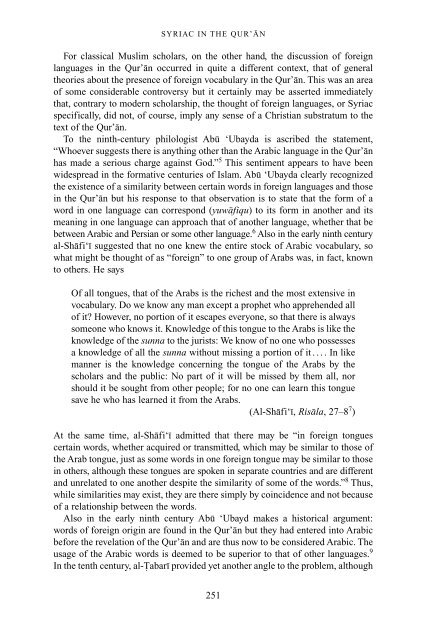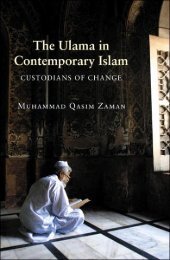The Qur'an in its historical context (pdf - Islam and Christian-Muslim ...
The Qur'an in its historical context (pdf - Islam and Christian-Muslim ...
The Qur'an in its historical context (pdf - Islam and Christian-Muslim ...
You also want an ePaper? Increase the reach of your titles
YUMPU automatically turns print PDFs into web optimized ePapers that Google loves.
SYRIAC IN THE QUR’AN<br />
For classical <strong>Muslim</strong> scholars, on the other h<strong>and</strong>, the discussion of foreign<br />
languages <strong>in</strong> the Qur’an occurred <strong>in</strong> quite a different <strong>context</strong>, that of general<br />
theories about the presence of foreign vocabulary <strong>in</strong> the Qur’an. This was an area<br />
of some considerable controversy but it certa<strong>in</strong>ly may be asserted immediately<br />
that, contrary to modern scholarship, the thought of foreign languages, or Syriac<br />
specifically, did not, of course, imply any sense of a <strong>Christian</strong> substratum to the<br />
text of the Qur’an.<br />
To the n<strong>in</strong>th-century philologist Abu ‘Ubayda is ascribed the statement,<br />
“Whoever suggests there is anyth<strong>in</strong>g other than the Arabic language <strong>in</strong> the Qur’an<br />
has made a serious charge aga<strong>in</strong>st God.” 5 This sentiment appears to have been<br />
widespread <strong>in</strong> the formative centuries of <strong>Islam</strong>. Abu ‘Ubayda clearly recognized<br />
the existence of a similarity between certa<strong>in</strong> words <strong>in</strong> foreign languages <strong>and</strong> those<br />
<strong>in</strong> the Qur’an but his response to that observation is to state that the form of a<br />
word <strong>in</strong> one language can correspond (yuwafiqu) to <strong>its</strong> form <strong>in</strong> another <strong>and</strong> <strong>its</strong><br />
mean<strong>in</strong>g <strong>in</strong> one language can approach that of another language, whether that be<br />
between Arabic <strong>and</strong> Persian or some other language. 6 Also <strong>in</strong> the early n<strong>in</strong>th century<br />
al-Shafi‘i suggested that no one knew the entire stock of Arabic vocabulary, so<br />
what might be thought of as “foreign” to one group of Arabs was, <strong>in</strong> fact, known<br />
to others. He says<br />
Of all tongues, that of the Arabs is the richest <strong>and</strong> the most extensive <strong>in</strong><br />
vocabulary. Do we know any man except a prophet who apprehended all<br />
of it? However, no portion of it escapes everyone, so that there is always<br />
someone who knows it. Knowledge of this tongue to the Arabs is like the<br />
knowledge of the sunna to the jurists: We know of no one who possesses<br />
a knowledge of all the sunna without miss<strong>in</strong>g a portion of it.... In like<br />
manner is the knowledge concern<strong>in</strong>g the tongue of the Arabs by the<br />
scholars <strong>and</strong> the public: No part of it will be missed by them all, nor<br />
should it be sought from other people; for no one can learn this tongue<br />
save he who has learned it from the Arabs.<br />
(Al-Shafi‘i, Risala, 27–8 7 )<br />
At the same time, al-Shafi‘i admitted that there may be “<strong>in</strong> foreign tongues<br />
certa<strong>in</strong> words, whether acquired or transmitted, which may be similar to those of<br />
the Arab tongue, just as some words <strong>in</strong> one foreign tongue may be similar to those<br />
<strong>in</strong> others, although these tongues are spoken <strong>in</strong> separate countries <strong>and</strong> are different<br />
<strong>and</strong> unrelated to one another despite the similarity of some of the words.” 8 Thus,<br />
while similarities may exist, they are there simply by co<strong>in</strong>cidence <strong>and</strong> not because<br />
of a relationship between the words.<br />
Also <strong>in</strong> the early n<strong>in</strong>th century Abu ‘Ubayd makes a <strong>historical</strong> argument:<br />
words of foreign orig<strong>in</strong> are found <strong>in</strong> the Qur’an but they had entered <strong>in</strong>to Arabic<br />
before the revelation of the Qur’an <strong>and</strong> are thus now to be considered Arabic. <strong>The</strong><br />
usage of the Arabic words is deemed to be superior to that of other languages. 9<br />
In the tenth century, al-Tabari provided yet another angle to the problem, although<br />
251



